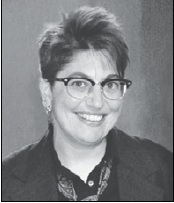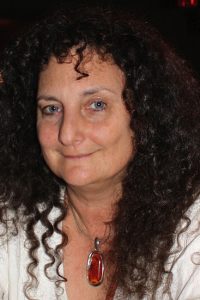Malka Older: Perspective Shift
MALKA ANN OLDER was born October 30, 1977. She attended Harvard for undergrad, where she studied literature, and has a master’s degree in international relations and economics from the School of Advanced International Studies of Johns Hopkins University. She got her doctorate in political science at the Institut d’Études Politiques de Paris, where she did work on governmental disaster responses. Older is an expert in humanitarian aid and international development issues with both field and organizational experience. She is a faculty associate at Arizona State University’s School for the Future of Innovation in Society, and teaches in the MFA program at Western Colorado University. Her essays have appeared in The New York Times, The Nation, and Foreign Policy, among other places.
She began publishing work of genre interest with ‘‘Tear Tracks’’ 2015 at Tor.com. Notable stories include Ignyte Award finalists ‘‘The Badger’s Digestion; or The First First-Hand Description of Deneskan Beastcraft by an Aouwan Researcher’’ (2021) and ‘‘The Locked Pod’’ (2022). Some short work is collected in …and Other Disasters (2019).
Older’s debut novel Infomocracy (2016) launched the Centenal Cycle Trilogy, which also includes Null States (2017) and State Tectonics (2018); the trilogy was nominated for a Best Series Hugo Award in 2019.
SF mystery novella The Mimicking of Known Successes (2023) is a current Nebula Award nominee and started a new series, The Investigations of Mossa and Pleiti, with second book The Imposition of Unnecessary Obstacles (2024) published earlier this year and a third volume forthcoming.
She hosts the Science Fiction Sparkle Salon video conversation series with Arkady Martine, Annalee Newitz, Amal El-Mohtar, Karen Lord, and Katie Mack.
Excerpt from the interview:
“For The Mimicking of Known Successes, I had an idea a long time ago that I put in my ideas folder: ‘How would people live on a gas planet?’ That was it. I thought, ‘Okay, they would have these rails that would go around with platforms.’ I got far enough in to think they would definitely have a zoo on one of these platforms, to just be like, ‘This is what animals are.’ I thought there would be some mystery about what was in the gas, which may come out later in the series – I don’t know. But that was it. It was really five lines or something in a Word doc.
“That idea was there, in the back of my mind, and during the lockdowns and the early stage of the pandemic when everything was super-duper stressful for all of us, and horrible in so many ways, I was reverting to comfort reading and just rereading books that I knew were going to make me feel better, and be able to take things on again the next day. I started to think about, what were the things that made a book comforting to me?
What things in reading that specifically gave me pleasure? Because there are definitely books that I reread over and over and I know, when I’m coming to certain sections, ‘Oh, I’m going to enjoy reading this.’ It’s not the plot, because I’ve read the book a million times. Sometimes, it’s connected to memories of when I first read the text, but a lot of times, it’s just the book. So I started thinking, ‘What are these things?’ A lot of them have to do with a specific kind of hardship that’s not grimdark hardship, but more, ‘Oh, it’s wet and rainy and I’m walking a long way, but then I’m going to get to a place where it’s comfortable,’ right? Or the kind of quest where it’s just, ‘Oh, the horses… I’m sick of riding and now I’m in a tent and there’s a windstorm and it’s raining.’ That’s one kind of comfort or pleasure you can get, when you’re reading about someone who’s going through something that’s not horrible, but it is uncomfortable, and you’re feeling your own comfort – and you know the characters are also going to get some comfort, too.
“There was that, and the whole mystery thing, which is really interesting to me, because the fact that mysteries are comforting is so interesting. According to literary theory there’s a whole thing about how mysteries resolve the things that are not resolved. They wrap things up. There’s something more to them, too. There’s the hook of wanting to find out the outcome. I also wanted academic in-jokes, obviously, and romance – all these things I was thinking about. I decided, ‘I’m just going to pack as much as I can fit of those elements into a book.’ I just wanted the book to be fun and comforting, and I looked up this old file and thought, ‘Oh, yeah, gas planet.’ The original idea had been a random gas planet somewhere in the cosmos, but somehow, at that point, I knew they had to be thinking about getting back to Earth, so it had to be Jupiter.’
“I honestly didn’t realize until halfway into The Mimicking of Known Successes that it’s actually a postapocalyptic story. There’s a lot that’s melancholy in it, and this terrible yearning for an Earth that these characters have never known, and for nature, and all these things they know they’re missing because they still have all this literature and art from Earth. But at the same time, they got a pretty sweet setup – it’s not that bad where they’re living, and they have a lot of good things going on. They have really rich lives: friends and concerts and academic research in a comfortable setting. They’ve got little cities that are interesting, and that people can go to see for fun. It’s kind of that contradiction of something that I really wanted to make really cozy and sweet, but it’s got this doom, too; this melancholy base note under it. Fortunately, by the time I figured that out, I was already very in the story and I was comfortable with things. I didn’t get too depressed in early 2021 trying to finish writing this. It was really a comforting thing for me to write, and I hope it becomes that for people reading it, too.
“I did consciously base it on Sherlock Holmes, to an extent, but more, really, on Sherlock Holmes reboots, because those are like catnip for me. I see Sherlock retellings and I’m like, ‘Yes, smash that button.’ I was really analyzing why that is, beyond the standard murder-mystery thing that I already mentioned. In addition to imprinting a little bit, young, on the Laurie King & Mary Russell Sherlock Holmes series – the first three books especially are really great – it also has a lot to do with the dynamic of a duo that’s working together, who have brains that work in very different ways. And yet, they come to a way of working together that makes sense for both of them.
“Thinking about that as my genre, I always thought it would be a series, because Sherlock Holmes and all the detectives that take after Sherlock Holmes are in series. Typically you get a lot of mysteries and over the course of the mysteries you get to know the characters a bit better. I reread the Holmes stories while I was writing, though I really like the reboots better, generally. There’s a lot in the original stories that’s just like, ‘That dude never actually listened to a woman in his life.’ Holmes was not only racist in the normal way, he was also snooty about white colonials. He was just totally xenophobic – first the race thing, and then, everyone else in the world. Sherlock is not really that nice; he’s pretty terrible. I obviously wanted to adjust that a lot. There are a lot of great Sherlock Holmes retellings that I love, so I had a lot of examples to work from. It’s about this dynamic of how people work together, and the way one has these leaps that seem intuitive, and the other is kind of a conduit.
“I want the series to have something of an overarching story, but also this regularity of new mysteries getting solved in every book. That’s what I’m aiming for, and I honestly don’t know how long I will go. There’s me, and there’s also the publishing side, so who knows. But for now, I’m thinking about it as not a trilogy, but as a series.
“There’s such a wide variety of Holmes retellings, or versions, from things like Katherine Addison’s The Angel of the Crows, which basically used the exact Holmes stories but tweaked them in this very interesting, alternate world way, to Sherry Thomas’s Lady Sherlock, which is set in the same period as the originals and has a fairly cohesive backstory for how that reality became the Holmes stories, but also is just incredibly subversive in terms of the main theme of the entire series. As far as I can tell, that’s basically: ‘It makes no sense to treat women this way’ – except angrier. The Enola Holmes books include a whole range of stuff that goes from very close to the stories to very different. Another one I like is Alexis Hall’s The Affair of the Mysterious Letter, which is total weird fiction, but still, it’s got that recognizable dynamic of these two characters, and riffs on a lot of the Sherlock Holmes cases.
Interview design by Francesca Myman
Read the full interview in the May 2024 issue of Locus.
 While you are here, please take a moment to support Locus with a one-time or recurring donation. We rely on reader donations to keep the magazine and site going, and would like to keep the site paywall free, but WE NEED YOUR FINANCIAL SUPPORT to continue quality coverage of the science fiction and fantasy field.
While you are here, please take a moment to support Locus with a one-time or recurring donation. We rely on reader donations to keep the magazine and site going, and would like to keep the site paywall free, but WE NEED YOUR FINANCIAL SUPPORT to continue quality coverage of the science fiction and fantasy field.
©Locus Magazine. Copyrighted material may not be republished without permission of LSFF.








